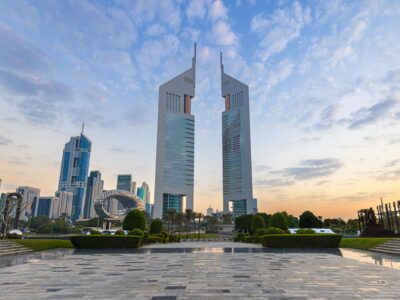Damian Reilly travels to Qatar to watch the latest Doha Debate: This house believes the Middle East would be better off with John McCain in the White House.
There’s a buzz about the thing even at the airport. In the departure gate at Dubai, the pen for the afternoon flight to Doha, there’s a growing smattering of the chattering class, or what passes for it in the Gulf, among the usual blackberried suits and furtive blue-collar workers. We’re all going for the same reason, pulled by the gravity of the evening’s debate. An intellectual event, and heaven knows there aren’t too many of those here yet.
This house believes that the Middle East would be better off with John McCain in the White House. That’s a beaut, don’t you think? A golden opportunity to rake over all of America’s activities in the Middle East for the last eight years, while the BBC’s cameras roll silently, beaming the arguments and the verdict to the entire planet.
And this won’t be the sort of guilt ridden, tail-chasing analysis that the western media specialises in, the western media who seem to have so dominated debate on this topic. No, this will be real Middle Eastern people, in the Middle East, speaking freely, asking the questions. It’s important.
Touchdown at Doha airport – which gleams – at 1pm. Some prospective audience members, the wealthy ones, are picked up by chauffeurs and whisked off to the Four Seasons. Not Insight. Insight gets the boneshaker to the two star flea pit he will call home for the night. The driver’s never heard of it. We find it in the end.
What to do, between now and 8pm? Research. Tonight’s speakers for the motion will be Danielle Pletka and Dr Saad Al-Ajmi. Pletka is Vice President for Foreign and Defense Policy Studies at the American Enterprise Institute for Public Policy Research.
Try saying that three times in a row. Her face gazes winsomely out from the media pack. It’s a very misleading photograph. In the flesh, as I will soon see, she is anything but winsome. She’s a ball-breaker.
Dr Al-Ajmi is a renowned Kuwaiti academic and commentator, and a former Minister of Information and Culture. His picture, in which his stare is constant and sober, is a more realistic depiction.
Against the motion, the speakers are Hafez Al-Mirazi and Michael Signer. Al-Mirazi is a celebrity throughout the Arab world by dint of the From Washington show on Al Jazeera television, which he presented from 2001-2007.
Clean-cut, preppy Signer was foreign policy advisor to Democratic Senator John Edwards’ presidential campaign. I will later, much later, see Signer signing autographs for young women who were in the audience for the debate.
I’m trying to think of questions to ask them later, if I get the chance, when my phone buzzes. A text message from the public relations team. If I hurry, I can meet Tim Sebastian in the genteel surrounds of the tea room at the Four Seasons. Sebastian chairs the Doha Debates, and is one of the BBC’s biggest international stars.
For years, in fact, for what seemed like forever, he presented one the broadcaster’s flagship programmes, ‘Hard Talk’, asking tough questions to the world’s good, bad and ugly.
Of course I am out of my hotel in a flash, bawling at a taxi driver to get me across town with a haste that would leave Lewis Hamilton in the shade. I skid into the tea rooms patting my hair down, and rubbing the tops of shoes on my calf muscles.
A pot of earl grey arrives as if from nowhere, and then Sebastian enters, serene despite the imminent responsibility of moderating a debate on such a contentious subject in the living rooms of millions and millions of people, from Washington to Hong Kong, and everywhere in between.
His face is interesting. In fact, his head is interesting. One moment he’s all hard bitten journalist, tortoise featured and cold-eyed. And then a flash of the most disarming smile on television, and he is transformed into a kindly, charming old man. Light and shade? More like day and night.
There in the tea rooms we talk for fifteen minutes about what he is doing in the Middle East, and what a force for good the Doha Debates have become since their inception in 2004.
Backed by the Emir of Qatar’s wife, Her Highness Sheikha Mozah Bint Nasser Al-Missned, the debates have not so much confronted taboo subjects, as battered down preconceptions about what can and can’t be said publicly in the Middle East. It is Sebastian who comes up with the motions for debate, and they have been eye-popping in their challenge to notions of censorship.
This House believes that Arab governments have failed the Palestinians. This House believes the face veil is a barrier to integration with the West. This House believes that George Bush has kicked open the door to democracy in the Middle East.
This House believes in the separation of mosque and state. This House believes that Arab governments are not interested in genuine reform. This House believes that torture is only acceptable under legal supervision. This House believes the Palestinians should give up their full right of return.
And then there are the guests. Bill Clinton has sat on the couch and answered questions from the floor, not in a debate format, but in a special question and answer session. So, too, has Dr Ayad Allawi, former Iraqi interim Prime Minister.
And so, most astonishingly of all, has Israel’s Deputy Prime Minster Shimon Peres, the first high ranking Israeli to visit Qatar in over ten years. In February last year, Peres sat in front of students in the Qatar Foundation’s grand debating hall and fielded questions on his country’s activities from the assembled students. It was not so long ago that such an event would have been unthinkable in the Middle East.
Sebastian is rightly proud of his achievements with the Doha Debates. At the mention of censorship, he wrinkles his brow. It hasn’t happened, he says, and it won’t. The producers have been promised editorial freedom by the relevant authorities.
From his body language, it is clear that Sebastian would not tolerate it anyway. His next motion, to be broadcast on the 22nd of this month, is: This House believes that Gulf Arabs value profit over people.
Surely, this will ruffle feathers, I tell him. After all, labour camps for Asian workers might be expedient in the GCC, but perhaps they might not be so palatable for a watching world. He raises his eyebrows disingenuously, as if to say that the thought had never occurred to him. His eyes twinkle though. And then he is off, swept away to rehearsals for the big event.
At 7pm, students and adults begin milling around the Qatar Foundation’s debating chamber, waiting to be allowed into the hall. A few moments’ inspection of the faces in the crowd reveals a very cosmopolitan mixture.
All shades seem to be represented, all creeds (later, questions to the panel will be asked by Afghans, Somalis, Sudanese, Gulf Arabs, Australians, Britons, and Americans).
Eventually the velvet rope is lifted and we are allowed to file excitedly in. In no time, the hall is filled to capacity, leading to no small amount of ire for those unable to get a seat. The producers read us the riot act about mobile phones, and the importance of sitting still for the duration. And then we are off.
Pletka goes first. Iraq is becoming stable she says. To change regimes now, Republican to Democrat, and then to pull American troops out of the country would be “the height of irresponsibility.” She says Obama would “certainly walk away” from Iraq. This, she adds darkly, would encourage “Iranian adventurism.”
Iran, according to her, has done “nothing but stick its finger in the eye of the International Atomic Agency, America and Europe.” McCain, she says, is the man with sufficient experience to keep Iran in check. Domestically, she says, McCain would not be a Bush clone. Indeed, “McCain has stood up to Bush more than any politician in America.” Particularly on the issue of taxation.
The moment her mouth has stopped moving, Sebastian leaps down her throat. Iran is powerful he says, directly because of America’s suppression of Iraq. “Iran has never been stronger,” he says. Pletka is having none of it. “I couldn’t disagree more,” is her riposte.
Signer’s next. He loves Barack Obama. The world needs change, he starts, and “who else has the potential to be genuinely transformative?” Obama’s childhood in Muslim Indonesia gives him perspective on Islamic affairs. Obama is a man who thinks before he speaks.
And far from giving Iran an easy ride, Obama “would deal with the country through tough engagement. Isolationism has given us backfire after backfire.”
Smear tactics by the Democrats have been underhand, he says, and the allegation that Obama is a “career politician,” and lacks empathy with the common man is spurious. Sebastian tells Signer that Obama has flip-flopped on policy statements. Signer replies that “it’s ok to make policy statements and then to modify them later, if need be.”
The secondary speakers take their turns. Dr Al-Ajmi opines that “we don’t want appeasement with Iran. Neither do we want all out war. We don’t want Iran to have nuclear weapons.” Al-Mirazi is the wittiest of the speakers: “Bush has made the Middle East worse than it was eight years ago. McCain would make Bush look like Mahatma Ghandi.”
And: “Cheney started the war in Iraq, and he is a quail hunter. Palin is a moose hunter! So think what she would do.” And even: “A McCain victory would do for the Middle East what Lehman Brothers did for the global economy.”
The crowd love all this, laughing and cheering. Questions from the floor elicit some good responses. Dr Al-Ajmi tells the crowd “McCain is old. Being President would be the pinnacle of his career. He will want to make changes. This is his last chance. Obama will be not be thinking about the Middle East. It would be the last thing on his mind. He will be thinking about his second term.”
Al-Mirazi doesn’t buy this, not for a moment. “That is rubbish,” he says. “We in the Arab world are always told to wait for the second term. Look at Bush. He has been even weaker in his second term than he was in his first.”
It doesn’t take long, either, for Pletka and Signer to go for each other’s throats. Pletka makes some casual smears about Obama’s past association with terrorists. Signer is furious. “That is a lie,” he tells her. “These accusations are unsubstantiated lies.”
When the dust settles, then the vote. The motion is rejected 87 percent to 13. The Middle East has spoken. Happily, perhaps, the world listened.






